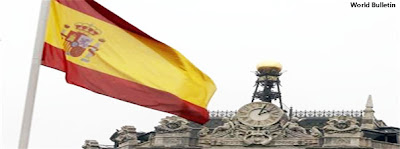'Mission impossible' for Spain's PM – another €40bn in cuts
25 March, 2012
Spain’s prime minister, Mariano Rajoy, faces the toughest week of his three months in office as he is forced to announce up to €40bn (£33.45bn) in spending cuts and taxes in a budget on 30 March, the day after a general strike.
As Rajoy's conservative People's party looked set for victory in key regional elections in southern Andalucia on Sunday, other European leaders and the markets were signalling Spain as now being the biggest single threat to the stability of the eurozone.
A win in Andalucia would give Rajoy unprecedented control over troublesome regional governments whose inability to reduce deficits has helped to put Spain centre-stage in the eurozone crisis. Asturias, a much smaller northern region, was also voting.
Rajoy was recently forced to backtrack by fellow EU leaders who refused to accept the deficit target of 5.8% of GDP Spain set unilaterally for this year. They told him to cut to 5.3%.
The EU economic affairs commissioner, Olli Rehn, has blamed attempts by Spain, the eurozone's fourth largest economy and a more potent threat than bailed-out Greece, Portugal or Ireland, to ease up on deficit-cutting for renewed pressure on sovereign debt.
"Because there was a perception Spain was relaxing its fiscal targets for this year, there has already been a market reaction of several dozen basis points on yields of Spanish bonds," he told reporters. "That shows how fragile the situation still is. To return to sustainable growth, it is a necessary condition to ensure sustainability of public finances."
Spanish economists described the deficit target as "mission impossible" for a country sinking back into recession and with 24% unemployment. They have warned of devastating consequences if Rajoy, who has already imposed cuts and tax increases worth €15bn, is obliged to find a further €40bn over nine months.
A vicious spiral of recession, unemployment and falling tax revenues threatens to double the real cost of a superficial annual adjustment of €32bn.
"This is mission impossible," said LSE professor Luis Garicano in a blog posting with Jesús Fernández-Villaverde of the University of Pennsylvania. They estimated the total real adjustment needed this year to cope with falling revenue at between €53bn-€64bn. That is twice the €30bn "Save Italy" plan announced by prime minister Mario Monti in December.
Angel Laborda of the Funcas think tank puts the total adjustment at €55bn euros in a 1.7% recession.
Observers believe Rajoy has delayed revealing the latest dramatic round of cuts and tax increases until after the elections. It is unclear where the axe will fall. His government has signalled that pension payments, unemployment benefits and sales tax are all untouchable – though it has retracted quickly on other pledges. There were rumours of increases in company taxes and electricity tariffs and sweeping cuts in public investment.
A general strike on 29 March will test how the Spanish feel about Rajoy's handling of an economy laden with private debt and fallout after a housing bubble burst.
On Saturday Monti accused Spain of turning the clock back on a eurozone debt crisis that had seemed to be easing. Spanish 10-year bond yields are now higher than their Italian equivalents. "It (Spain) certainly made profound reform of the labour market but it did not pay the same attention to public finances," he told Italian business leaders. "This is causing us big concern because their yields are rising and it wouldn't take much to recreate trends that could spread to us through contagion."
Monti later softened his line, saying he had every confidence in Spain and Rajoy.
Citibank's chief economist, Willem Buiter, told Bloomberg radio that Spain was now the country that most worried him. "It's really moved to the wrong side of the spectrum and is now at greater risk of sovereign restructuring than ever before," he said.




No comments:
Post a Comment
Note: only a member of this blog may post a comment.